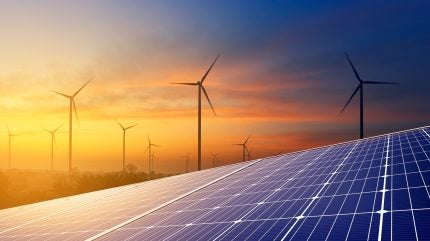
The German Federal Network Agency (Bundesnetzagentur) has released a report detailing the status and projected development of electricity supply security in the country, with an analysis extending up to 2035.
The report outlines two scenarios: one where legal and political objectives are met, and a “delayed energy transition” scenario that examines the impact of slower renewable energy rollout and less demand flexibility.

Discover B2B Marketing That Performs
Combine business intelligence and editorial excellence to reach engaged professionals across 36 leading media platforms.
According to the report, Germany can maintain a secure electricity supply by adding up to 22.4GW or up to 35.5GW of additional controllable capacity by 2035, depending on the scenario.
These figures are gross, not accounting for the decommissioning of older plants.
The report highlights the importance of additional controllable capacity such as power plants, particularly if electricity consumption does not become more flexible or is delayed.
Bundesnetzagentur president Klaus Müller said: “The electricity supply will remain secure in future if additional controllable capacity is built. Our monitoring underlines the significance of the Power Station Strategy planned by the federal government.

US Tariffs are shifting - will you react or anticipate?
Don’t let policy changes catch you off guard. Stay proactive with real-time data and expert analysis.
By GlobalData“The additional necessary capacity should be provided via a capacity mechanism. It is also important for more and more electricity consumers to respond flexibly to electricity prices.”
Furthermore, the report notes that delays in adding generating installations, especially renewable generation, could result in the electricity market being unable to fully meet demand, necessitating additional reserves outside the market for supply security.
The Bundesnetzagentur supports the federal government’s planned legal framework for new power stations to be installed by 2030, aligning with the necessary increase in capacity indicated by the 2022 security of supply monitoring.
Enhancing the flexibility potential of new consumers, including heat pumps, storage facilities, electric vehicles, and industrial load flexibility, is said to be crucial for supply security.
Energy storage is also set to play a central role, potentially reducing the need for additional power plant capacity in certain market situations.
The report underscores the importance of rapid wind and solar power expansion, not only for climate targets but also for supply security, as delays could have adverse effects.
It also confirms that energy transportation volumes will continue to grow, necessitating rapid network expansion and indicating that redispatch measures will remain necessary in the future.
The German Federal Network Agency has chosen 258 ground-mounted solar projects, totalling a capacity of 2,271MW, in its most recent tender.
This tender, which focused on ground-mounted solar arrays and solar systems on structures other than buildings, received bids exceeding the agency’s target of supporting 2,266MW of projects.



